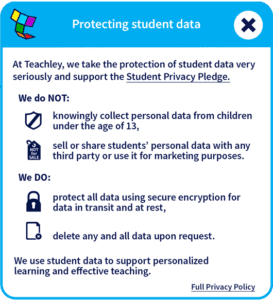As a second grade teacher, I used to spend hours each week trying to assess how my students were progressing with their addition fact fluency. I created a series of a dozen or so mini-quizzes that increased in difficulty, and students progressed through them at their own pace. Some students would work on the zero-rule problems (e.g. 6 + 0) or plus-ones (e.g. 7 + 1) while others worked on near doubles (7 + 8) or adding tens (3 + 10). It was an altogether complicated system to manage, but the weekly quizzes really helped me see how I could target small group interventions, and who was stuck on a particular set of problems.
However, one of the major drawbacks to the work was actually giving the quizzes. The standards said that students needed to have the problems memorized. To assess this in a group setting meant giving a timed quiz. Each Friday as I would say “Pencils down,” there were inevitably a few heartbroken kids, who were visibly upset that they didn’t get to finish. I prayed that they were not developing serious math anxiety just so I could get some good assessment data.
While getting my PhD, I realized that there are better ways of assessing fluency with technology. In an app, you can easily see which problems students have memorized by looking at how quickly they solve a particular problem. Students can immediately see how they did and which problems they need to work on, eliminating the wait until the quiz is graded and handed back. Teachers no longer need to spend hours managing and analyzing paper quizzes. But, most importantly, there don’t need to be those “Pencils down” moments that give kids such anxiety.
I decided to start a company to create games that give teachers valuable formative assessment data. I had gone from the classroom to academia, and now I was throwing myself into the entrepreneurship world. All of a sudden, there were a ton of things I needed to have learned yesterday. Privacy was a big one with COPPA, FERPA and a growing number of state regulations emerging. I watched leaderboards disappear from children’s apps overnight and the emergence of “age gates” blocking children’s access to parent/teacher sections of apps because of COPPA concerns. I saw large companies fail because they were unable to communicate their vision for handling of data and security in compliance with FERPA.
[As an educator, m]y students’ parents and fellow educators trusted me to use that data in the children’s best interest. As a co-founder of a company, I do not have those luxuries. It’s critical that my team plans for and protects against potential hackers or human error. We also need to earn the trust of the students, educators, and parents we serve.
As a teacher, there was no hacker sitting outside my classroom, waiting for the opportunity to rifle through my students’ quiz results. My students’ parents and fellow educators trusted me to use that data in the children’s best interest. As a co-founder of a company, I do not have those luxuries. It’s critical that my team plans for and protects against potential hackers or human error. We also need to earn the trust of the students, educators, and parents we serve. To earn that trust, we have been proactive on the privacy front, working closely with privacy experts as we develop our technology.  Teachley was among the first companies to sign the Student Privacy Pledge, in which we promise, among other things, that we will not use student data for marketing purposes. When we released our Teachley Connect platform, which collects student data from third party games, we intentionally designed the system in such a way as to never share students’ personal data with the other game developers, even though many of our competitors regularly do this.
Teachley was among the first companies to sign the Student Privacy Pledge, in which we promise, among other things, that we will not use student data for marketing purposes. When we released our Teachley Connect platform, which collects student data from third party games, we intentionally designed the system in such a way as to never share students’ personal data with the other game developers, even though many of our competitors regularly do this.
We recognized that Privacy Policies tend to be quite lengthy and filled with legal jargon. We tried to write ours in as friendly a way as possible so that our users can easily understand what data we collect, how it’s collected, and what we do with that data. To make it even more reader-friendly, we created a privacy highlights sheet to quickly convey our broad vision and commitment to data and security protections (see image), which helped us gain our users’ trust. With the privacy landscape constantly changing, it’s critical we keep up with new standards for security and privacy.
As a teacher, it was important to me that my students’ parents trusted that their children were safe in my classroom. As an edtech entrepreneur, I take responsibility for ensuring the data for each student we serve is secure and protected.
***
Kara Carpenter, PhD is Cofounder of Teachley, an edtech startup giving elementary schools formative assessment data from games. She is a National Board Certified Teacher with over 10 years of experience teaching children of all ages as a classroom teacher, outdoor education instructor and Peace Corps Volunteer. She has a PhD in Cognition and Learning from Columbia University with a research focus on teaching and detecting math strategies via games. Her dissertation became an Apple Design Award winning app, Addimal Adventure.
Image: “student_ipad_school – 233” by Brad Flickinger is licensed under CC BY 2.0.


